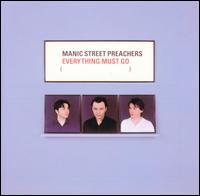Review:
“It's difficult not to look at The Holy Bible as Richey James [Edwards]’ last will and testament.” AMG because of his disappearance on February 1, 1995, “yet that only makes the record all the more powerful. A remarkable step forward from the Manic Street Preachers’ first two records, The Holy Bible is a tense, harrowing collection of tortured, cryptic declarations of depression.” AMG “It is considered to be the band’s best work by many” WK and “is regarded by most critics and fans to be the band’s most uncompromising album, and indeed as one of the most introspective, dark and impenetrable albums in rock history. It was compared to Nirvana’s 1993 album In Utero in almost every review at the time, which is no coincidence as Edwards had been listening to that album…at the time.” WK
“Whereas lyric duties on the two previous albums were split fairly evenly between Edwards and the band’s bass player Nicky Wire, Wire has said in interviews that Edwards wrote about 70-75% of the lyrics on The Holy Bible, which may explain why the lyrical themes were much darker than on later albums following Edwards’ disappearance.” WK Edwards’ lyrical contributions “were generally of a more personal nature than on previous albums” WK consisting “of many diary/journal entries…and were, in essence, his final writings” WK and, according to the January 2006 issue of Q magazine, detail “the horrors in Richey Edwards’ head.” WK
“Many of the albums songs still dealt with the wider political and cultural themes that had dominated Generation Terrorists, though the new songs drew on Edwards’ knowledge of political history more than that album. The tone was also angrier and more judgemental in general, with Archives of Pain and The Intense Humming of Evil being particuarly damning indictments of the evil side of mankind’s nature.” WK
“As well as the subject matter the actual structure of the lyrics was…more experimental, fragmented approach comparable to the modernist poetry of T.S. Eliot and Dylan Thomas…As well as ignoring a linear narrative, much of Edwards’ writing from this period ignores standard grammar and traditional syntax, creating a rougher, rawer feel that arguably creates an even more expressive lyric due to its jagged edges.” WK
“The recording quality is of a considerably lower fidelity than their previous albums and results in a blurrier, murkier sound that is both harsher and less radio-friendly than the punchier sound of their previous and subsequent albums.” WK “The only instruments used on the album are the electric guitar, bass, drums and percussion. Other instruments such as the piano or strings are rarely present on the album – there are small synth parts that can be heard at the beginning of She Is Suffering and Die in the Summertime. However, upon listening, the reasons for this soon become apparent: each song is implicitly linked and related to all the other songs on the album; as such, the album sounds like a complete set of songs that support and complement one another.” WK
Review Source(s):
Related DMDB Link(s):

 Click on box above to check out the DMDB on Facebook.
Last updated March 27, 2011.
 |

